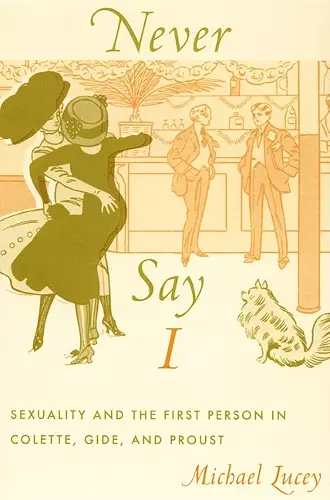Never Say I
Sexuality and the First Person in Colette, Gide, and Proust
Format:Paperback
Publisher:Duke University Press
Published:17th Nov '06
Currently unavailable, and unfortunately no date known when it will be back

Literary study that focuses on how early-20th-century French writers (Gide, Collette and Proust) used first-person narrative to explore questions of sexuality and group identity.
Rereads the works of Colette, Gide, and Proust to show how central representations of sexuality were to the evolution of literary prose forms in twentieth-century France.Never Say I reveals the centrality of representations of sexuality, and particularly same-sex sexual relations, to the evolution of literary prose forms in twentieth-century France. Rethinking the social and literary innovation of works by Marcel Proust, André Gide, and Colette, Michael Lucey considers these writers’ production of a first-person voice in which matters related to same-sex sexuality could be spoken of. He shows how their writings and careers took on political and social import in part through the contribution they made to the representation of social groups that were only slowly coming to be publicly recognized. Proust, Gide, and Colette helped create persons and characters, points of view, and narrative practices from which to speak and write about, for, or as people attracted to those of the same sex.
Considering novels along with journalism, theatrical performances, correspondences, and face-to-face encounters, Lucey focuses on the interlocking social and formal dimensions of using the first person. He argues for understanding the first person not just as a grammatical category but also as a collectively produced social artifact, demonstrating that Proust’s, Gide’s, and Colette’s use of the first person involved a social process of assuming the authority to speak about certain issues, or on behalf of certain people. Lucey reveals these three writers as both practitioners and theorists of the first person; he traces how, when they figured themselves or other first persons in certain statements regarding same-sex identity, they self-consciously called attention to the creative effort involved in doing so.
“A breakthrough book. Never Say I isn’t just an ‘important contribution,’ as people say. It is a necessary one, disturbing many simplistic assumptions about the writing of same-sex subjectivity in modern France.”—Ross Chambers, author of The Writing of Melancholy: Modes of Opposition in Early French Modernism
“In this abundantly helpful work, Michael Lucey retrieves a vital moment in modern culture when saying ‘I’ required not only a certain courage but also a certain art.”—D. A. Miller
“Never Say I is a clear, cogent literary history of the articulation of the discourses and representations of same-sex desire and homosexuality in early twentieth-century French literature, and it is an important addition to our understanding of the literature and culture of the period.” -- Lawrence R. Schehr * Modern Philology *
“Michael Lucey constructs a deft and innovative model for thinking about the problems Colette, André Gide, Marcel Proust, and others faced as they struggled to articulate a first person that might aptly speak about — and, just as often, speak for — same-sex sexualities in a fraught linguistic, literary, social, and political arena. . . . This notion of the I as a figure—rather than as a subject—is one of the most important and exciting contributions Never Say I makes. . . . Lucey’s formulation of the I as a figure allows us to see how each I can indeed be read, so long as it is read with care and attention to the fields within which it occurs. And it allows us to see more clearly the sophistication and simultaneous earnestness and playfulness with which these novelists, theorists of the self, handled the critical task of learning to articulate a queer first person.” -- David Namie * GLQ *
“Though the book’s title highlights the role of Gide, Proust, and Colette in this process, Lucey’s study offers much more than a rereading of these three well-studied figures and their work. Instead, he not only investigates the “position-taking” that came to characterize their literary output but also seeks to understand these positions in the context of an intimate web of writers, critics, and others in the cultural elite in France in this period.” -- Patricia Tilburg * Journal of the History of Sexuality *
ISBN: 9780822338970
Dimensions: unknown
Weight: 490g
336 pages